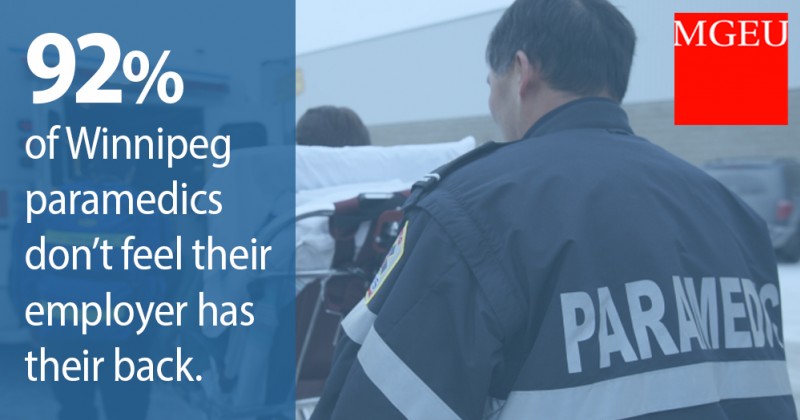The results from a new survey of Winnipeg paramedics shows bullying and harassment are prevalent within the Winnipeg Fire and Paramedic Service (WFPS) and the time to change the workplace culture is now.
The online survey commissioned by the MGEU, reveals that an alarming number of Winnipeg paramedics (92%) don’t feel their employer has their back (including 62% who felt very strongly) and two-thirds (67%) say they sometimes feel nervous or anxious going to work because of a negative working environment.
The survey results also show that 92% of respondents feel WFPS Chief, John Lane, has not shown leadership or set the right tone about issues within EMS (with 88% saying the same about Mayor Brian Bowman’s leadership).
"For many years now, MGEU has been raising concerns about disrespectful and discriminatory behaviour within the WFPS,” said MGEU President Michelle Gawronsky. “Now the crisis in this workplace has deteriorated to the point that patient care was placed at risk. We’ve been calling for City and WFPS leadership to step in and correct this behaviour because emergency medical services are too important to allow this situation to continue."
The survey results confirm a troubling pattern:
- 65% have considered leaving the profession because of how workplace issues are handled;
- 44% feel the environment in their fire hall is very toxic;
- 60% report having been bullied;
- 47% report having been harassed;
- 33% have been the target of sexism; and
- 18% have been the target of racism.
Gawronsky says the unhealthy, disrespectful working environment is rooted in the differences between how firefighters and paramedics are treated by senior management: almost 89% of survey respondents said firefighters are treated preferentially by senior management, compared to 2% who feel paramedics are treated preferentially, and only 4% who say there is equal treatment by senior management.
While disrespectful workplace behaviour has been an issue for years, she says it has further deteriorated since an October 2020 incident, when a paramedic accused four firefighters of failing to provide requested medical assistance for an Indigenous patient in a timely manner.
An independent investigator found the firefighters’ refusal delayed the patient’s transportation to hospital by two minutes and their conduct was likely motivated by implicit (or unconscious) racial bias. However, Chief Lane said this “could not be verified.”
“The whole situation has brought to light the toxic workplace culture at the WFPS,” said Gawronsky. “Instead of taking meaningful action to change this toxic culture, the Mayor’s glib political tactic has been to dismiss them as some kind of feud between union leaders. These survey results show that this deeply troubled workplace needs more than a political brush-off. This workplace urgently needs leadership and change.”
“With Chief Lane announcing his retirement, it’s an opportunity for the City to turn a new page. But changing the person in the Chief’s chair will not be enough; we need to see a whole new approach from the new Chief and the City,” she said.
In total,
106 of 261 active Winnipeg paramedics (40%) completed the survey, which was
carried out by Viewpoints Research between April 13 and 29, 2021.

